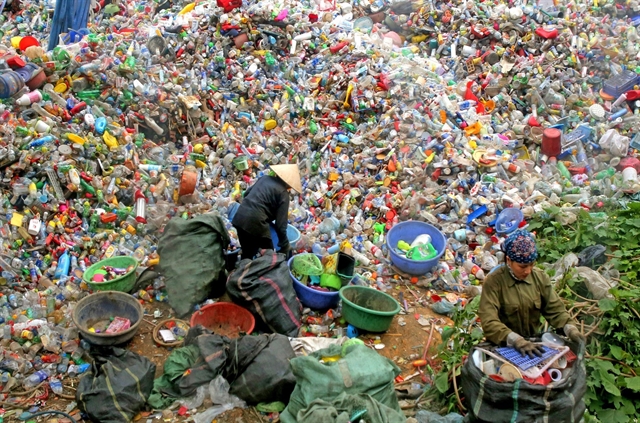 Economy
Economy

 |
| Used bottles are being gathered before they are sent to recycling plants in Lào Cai Province. The unofficial sector undertakes the recycling of between 40 to 95 per cent of urban waste in Việt Nam. VNA/VNS Photo Ngọc Hà |
HÀ NỘI — The Ministry of Natural Resources and Environment (MONRE) is developing a legal document to specify fees for recycling products and packages, which is expected to be applicable in 2024.
Under the Law on Environment 2020 and the governmental Decree No.08, the recycling of products and packages will be mandatory for those who import or produce batteries, tyres, lubricants, and packaging as of January 1, 2024.
Those that import or produce electronics will be subject to mandatory recycling from January 1, 2025, whereas those importing or producing vehicles must follow suit after January 1, 2027.
If the importers and producers do not want to recycle their products and packages on their own, they must pay some fees to the Vietnam Environment Protection Fund to have it assist them in recycling the items.
The calculation of the fees will be regulated in the above-mentioned legal document, which is under development.
Phan Tuấn Hùng, head of the Legal Department, MONRE, said the document would be submitted to Prime Minister for approval in 2023 and come into force on January 1, 2024.
He also said the document would not be identical to those of any other countries because different countries have different fees for the recycling of products and packages.
As such, it was being developed in a way specific to Việt Nam. It would cover the aggregate fees charged for recycling, including collecting fees, sorting fees, and transporting fees, and take into account the views of all parties concerned.
Nguyễn Đức Quảng, an expert from the School of Environmental Science and Environment, Hanoi University of Science and Technology, suggested two types of fees applicable to recycling, one for basic recycling and one for advanced recycling.
Basic recycling is a broad-based process applied to general products and packages, whereas advanced recycling involves those that are difficult to recycle. The latter has different rates for different levels of difficulty to recycle.
"High fees would provide an incentive for manufacturers to re-design their products and packages in a more environmentally-friendly way," said Quảng.
Ko Jae Young, former Minister of Environment, Republic of Korea, shared Quảng's view, saying that fees should be charged differently for different products and packages.
He also said the calibration of fees should be delegated to independent consultancies, who will get the job done by calculating the real costs of recycling in the country.
The Vietnam Environment Protection Fund said it had been offering preferential loans with annual interest rates of between 2.6 and 3.6 per cent to plastic recycling enterprises, to promote the green practice in Việt Nam.
Remarkably, eligible enterprises could take out the fund's loans to finance up to 70 per cent of their recycling projects.
According to the Vietnam Plastics Association, Vietnamese enterprises would save roughly 15 per cent of their costs if they recycle between 35 to 50 per cent of their plastic waste.
For the time being, the recycling of between 40 and 95 per cent of urban waste is undertaken by the unofficial sector. HCM City takes the lead in this regard with a rate of 95 per cent. — VNS




